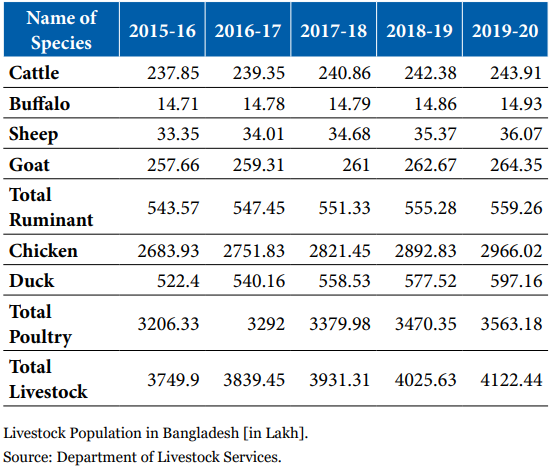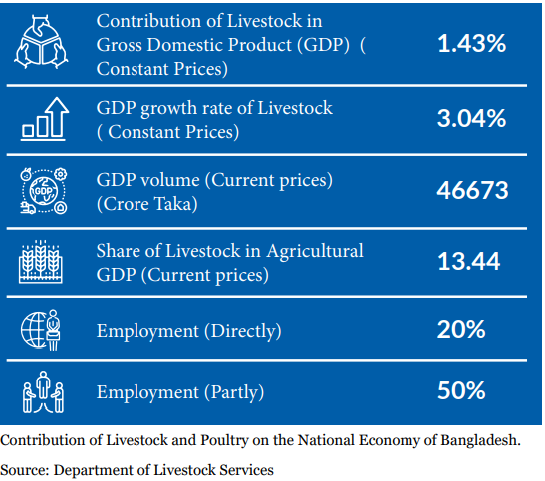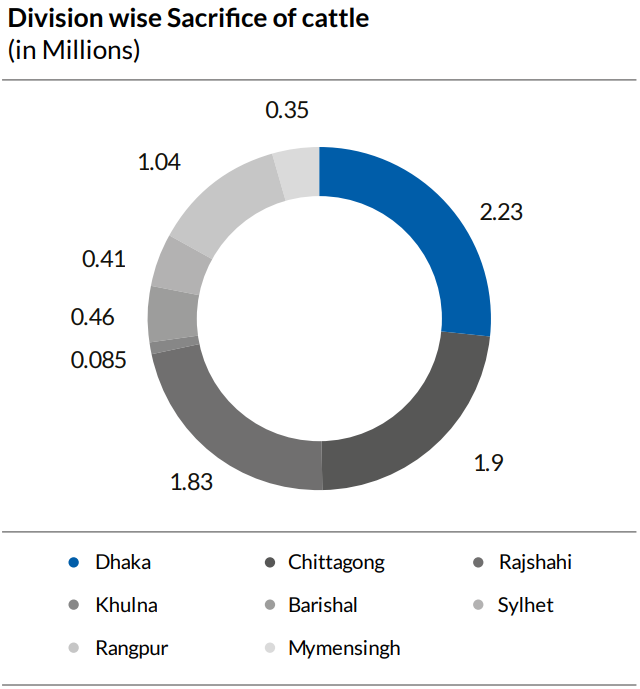ONLINE CATTLE MARKET: A SOLUTION FOR THE PANDEMIC AFFECTED EID
The road to digitization has once again saved Bangladesh, by providing a path for the trade of cattle online. To curb the spread of Covid the nationwide lockdown right before Eid-ul-Azha was a red signal for the cattle farmers, who rear cattle throughout the year in order to sell them during Eid. With the new delta variant, it was incumbent for the government to implement the lockdown in order to tackle the upsurge in infected cases, however, the government took into consideration the sufferings of the cattle farmers, who would encounter a massive loss if they were unable to sell their cattle. Last year Dhaka North City Corporation, the ICT Division, E-Commerce Association of Bangladesh (eCAB), and Bangladesh Dairy Farm Association shook hands and jointly
took the initiative of launching “Digital Haat” to help the small businesses. Learning from the loopholes of the previous year, a more organized approach was taken this year as they had time to deduce the proper rules and regulations.
Government and Non-Government initiatives through digital modes
According to Dhaka Tribune, this year around 387,579 cattle were sold online, which was five times more than what it was the previous year. Due to proper planning and spread of information farmers across Bangladesh from districts, upazilas, and even villages sold their animals on this platform. On the government’s “Digital Haat” website farmers across the country uploaded the details of their animals, this provided the buyers with an eclectic range of options to select from. In order to ensure proper satisfaction of buyers and a seamless money transfer procedure, the “ESCROW” service was initiated. The system does not directly transfer the money to the seller, the money is first deposited on an account in Bangladesh Bank, once the buyer confirms that they were satisfied with the purchase the money was released by Bangladesh Bank and sent to the seller, this helped to avoid any fraudulent activity. According
to Daily Star, this year around 241 haats were able to connect to around 1843 online shops including the marginal ones.
In addition to this, the “Full Qurbani Service” was introduced as well. Even though this service has been going on for a long time in Bangladesh, it came under the light recently due to the pandemic. This service allows customers to order a full Qurbani service, where the animal will be sacrificed in the slaughterhouse and the processing of the meat will be done and delivered to the customers’ homes through air-conditioned vehicles.
Bengal Meat: the pioneer of the “Full Qurbani Service” in Bangladesh, has been performing this service for quite a few years now. Bengal meat has been ensuring safety protocols during Eid ever since the pandemic started. This eid, they sold only cows, however, live cows were not sold, and provided the “Full Qurbani Service” only. The cattle were quarantined since March and were under regular health checkups. Extra caution was taken on what the animals were fed in order to ensure quality. On their e-commerce platform relevant information about the cattle, like their weight, breed, size, gender, color, and feed type were mentioned. The range of cattle they provided this year were: Sahiwal, Sindhi, Holstein-Frisian, Jersey, Brahman, Red Chattagram cattle, Pabna cattle, and Mirkadim cattle. The cattle were slaughtered and processed in their factories and were delivered to the customer’s doorsteps starting from the
second day of eid. Each packet contained 3kgs of meat and all of the packets were then bagged into a master bag.
Daraz: the renowned e-commerce platform has not been standing behind in providing a digital haat for their customers. Daraz had an eclectic range of animals this year, which were all divided into categories based on the cattle’s age, color, price, and location on their website. According to United News of Bangladesh this year, Daraz listed 1000 animals (700 cows and 300 goats) on their website, in addition to that had a huge deal of discounts available.
Bikroy.com: the e-commerce site has been selling cattle online for the past few years as well. Farmers from around the country post ads about their cattle on the bikroy.com website. Interested customers will have to contact the seller and pay for the delivery charge in advance. Recently Bikroy.com has partnered with sheba.xyz, the biggest service platform in the country, to make the cattle delivery service to the customers’ doors a hassle-free process. The process is not a labyrinth one, all the customers need to do is select the desired animal, contact the seller, pay for the delivery fee, and have the cow delivered to their doorsteps.
iFarmer: a platform that acts as a bridge between investors and farmers. Investors who are interested in investing on a farm, can invest through iFarmer’s app and monitor the farm virtually. Upon maturity, the livestock is sold and the investors get their share of the money. Apart from helping farmers receive
funds, iFarmer also provides consultations on how to feed and properly raise the livestock. In addition to these, iFarmer takes complete supply chain control by connecting farmers with buyers directly. Hence, through their website investors can invest on farms and buyers can purchase livestock following a few easy steps. iFarmer also has taken initiatives to make the Eid-ul-Adha easier amid the pandemic. They have played duel role: One as a supplier to a number of vendors where they supplied meat. On the other hand, they also sold cattle online and also in traditional way: by selling cattle in the haats.
Sheba.xyz: from providing butchers to customers through online booking, last year sheba.xyz launched the “Full Qurbani Service” keeping in mind the safety protocols due to the pandemic. In addition to this, they also introduced the shared sacrificial option for customers who are not well-off to sacrifice an entire cow or are willing to give a shared sacrifice. For them sheba.xyz curved a way to share the cost of Qurbani with other customers who are willing to do the same.
Livestock Sector of Bangladesh
The livestock sub-sector plays a vital role in the economy of Bangladesh. According to the department of livestock services, the livestock sector contributes to about 1.43% of the GDP of the country. Around 50% of the country’s population relies on this sector indirectly and 20% directly. Most of the cattle reared throughout the year are sold during Eid-ul-Azha.


This year, Bangladesh was able to surmount the obstacles due to Covid and rear enough animals for Eid-al-Azha that importing animals was not required. According to the Department of Livestock Services (DLS) this year, 12 million sacrificial animals, including 4.54 million cows and buffaloes were in stock for Eid. Which compared to last year, 11.8 million, was more. However, due to the restrictions in movement, prices were hinted to be higher this year by the farmers. In addition to that, the rearing cost has been higher, which further explains the high price. Even after all the hurdles, a total of 9,093,242 animals were sacrificed this year, according to the Dhaka Tribune. The pie chart shows the number of animals sold (in millions) throughout the country this year.

Hope for the Digital cattle market to persist
Despite the countless hurdles that the country has been encountering due to Covid, the dream of digital Bangladesh has allowed us to keep up with the pace of other developed countries. Amidst a crisis, Bangladesh was able to successfully celebrate the occasion of Eid following safety precautions, in the upcoming years with more transparency of information to the farmers, more trust gained from the citizens, and with more additional safety and security precautions the country will be able to boost sales furthermore. Thus, with proper policy implications, the tradition of buying sacrificial animals from physical haats could be normalized to “Online Haat”

BANGLADESH GOING GREEN: GREEN BUILDING & LEED CERTIFICATION FOR ENSURING SUSTAINABILITY AND SAFETY
Green Building and LEED Certification: One of the many attempts to ensure sustainability in Bangladesh.
The spiraling concern for saving the environment and its resources has led many platforms to opt for the green building strategy, which takes into account
the environmental factors and efficient distribution of limited resources. Bangladesh has also stepped up in the initiative of Green building strategy, and at present Plummy Fashions, of Bangladesh, is thegreenest knit apparel factory in the world awarded by USGBC ( U.S. Green Building Council). Amongst the
numerous Green Building rating systems available, LEED certification is the most widely used rating system worldwide, as well as in Bangladesh.
Leadership in Energy and Environmental Design (LEED) has 110 credits in total, and consists of 4 levels of certification for industries, offices, retails, residential, and other building projects. LEED Certified buildings are on the rise globally, with the USA occupying the leading position in terms of projects and space. The LEED Certification process consists of four simple steps, starting with registering for a project online through their website.
Within a short time, the number of LEED-certified projects has risen above 160 in Bangladesh, this has led multiple banks and NBFIs, including Bangladesh
Bank, to come up with several financing schemes to help finance the green construction projects. Besides these, Green Transformation Fund and SREUP Financing Scheme (Program to Support Safety Retrofits and Environmental Upgrades in the Bangladeshi Ready-Made Garments Sector) have also come up with initiatives, specific to the RMG industry, to finance green building. Thus, these initiatives have allowed many clients to benefit from the low-cost funds.
With the availability of more funding options and awareness, there can be an upsurge in the number of green building projects in Bangladesh. With climate
change being one of the most heated issues in the contemporary world, it is time to train more experts in this field so that the new generation of professionals will understand the significance of the issue.
Bonnishikha Chowdhury
Executive Officer
IDLC Finance Limited